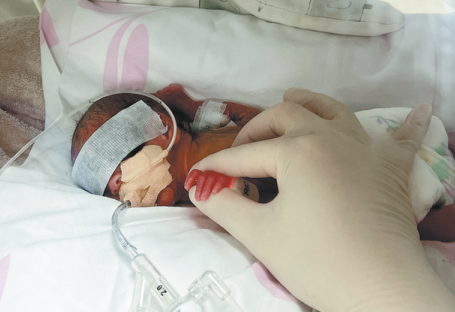
A photo of Lele taken at the Children’s Hospital of Fudan University in Shanghai on Aug 31. [Photo by Wang Juliang/China Daily]
Defying the odds, a baby born after just 22 weeks of gestation and weighing merely 450 grams has been discharged from the Children’s Hospital of Fudan University in Shanghai on Friday.
The infant, which was smaller than a bottle of water at birth, set a new record for the youngest surviving premature baby in Shanghai, marking a breakthrough in the treatment of “extremely premature” infants at the hospital, which is a national-level medical center for children.
The girl, nicknamed Lele, was born with fragile vital signs on July 27 at a hospital in Fengxian district on the outskirts of the city. Her mother, who prefers to remain anonymous, had experienced several miscarriages before.
Immediate intervention efforts, including intubation for mechanical ventilation, pulmonary surfactant therapy and intravenous fluid administration, were initiated after her birth. She was transferred to the Children’s Hospital’s neonatal intensive care unit by a specialized transport team the same day.
Yuan Lin, executive director of the neonatal diagnosis and treatment center at the Children’s Hospital, explained that infants born before 24 weeks of gestation are classified as “extremely premature” and face significant risks due to underdeveloped organ systems — particularly the respiratory, circulatory and neurological systems — making treatment highly complex.
According to data from the Chinese Neonatal Collaboration Network, the survival rate for premature babies born after 22 to 23 weeks of gestation in China is only 10.3 percent, with rare instances of survival reported for those born after 22 weeks.
Upon arrival, Lele received meticulous care and a comprehensive treatment plan tailored to her critical condition. Despite her miniature size and underdeveloped organs, the medical team provided specialized care and advanced treatments to navigate her through the initial high-risk period.
Zhang Rong, deputy director of the hospital’s neonatal diagnosis and treatment center, said that throughout the treatment process, the medical team paid close attention to the changes in Lele’s condition, and formulated a detailed multidisciplinary approach focusing on respiratory, circulatory, neurological and nutritional management tailored to the developmental stages.
“For example, we were pretty accurate about the volumes regarding her daily milk intake, intravenous fluids and nutrients. Meanwhile, advanced respiratory support technology was used to help Lele get rid of invasive ventilation,” she said.
After five months of treatment, Lele had reached her corrected gestational age of one month past her expected due date when she was discharged from the hospital. She did not rely on oxygen support for breathing anymore, her milk intake volume became normal and she weighed 2.74 kilograms.
The hospital established a multidisciplinary follow-up team that will focus on respiratory, nutritional, pediatric health, nursing and neurological assessments to monitor Lele’s growth progress closely in the long run, particularly evaluating her neurological development regularly. Experts predicted that the girl is expected to catch up to a normal growth trajectory when she is around a year old.
Wang Yi, president of the Children’s Hospital of Fudan University, said: “There are still significant challenges for extremely premature infants’ survival. However, with continuous advancements in medical technology and care practices, coupled with the development of neonatal medicine, there is hope for more breakthroughs in pushing the boundaries of survival for such babies, bringing hope to their families.”
,https://english.shanghai.gov.cn/en-Latest-WhatsNew/20241231/f69fc82ae12d49beb952d7ea972cfaf1.html
